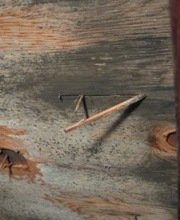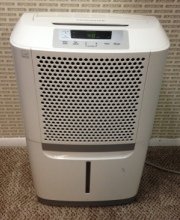Find a Mold Specialist Now
Click or Call, Toll-Free 24/7
Mold In Central AC Systems
It probably does not surprise you to hear that mold in air conditioner systems can make you sick. Most people are aware that exposure to household mold can cause illness. Whether the mold is in your air conditioner unit or in your home heating, ventilation and air conditioning (HVAC) ducts, it is a health hazard. And the truth is, if you have mold in your air conditioner, there is probably also mold in the HVAC ducts, since it's all connected.
Mold in window air conditioning units is also a problem, since window units blow mold spores out into the room. A window unit isn't connected to your home's heating and ventilation ducts, though. At least initially, mold blown from a window air conditioning unit affects only the room in which the window unit is installed. Mold in a central air system, on the other hand, can easily affect the entire home.
You can read more about mold in window air conditioners here.
How Does Mold in Air Conditioner Systems Make You Sick?
Exposure to mold can make you sick in several ways.
Microscopic mold spores, too tiny to see and very light, are easily inhaled. The mold spores irritate and inflame the airway and lungs, causing coughing, sneezing, sinusitis, bronchitis, pneumonia, asthma attacks, and other respiratory problems. You can read more about mold in the lungs.
Mold can also trigger allergic reactions. Not everyone is allergic to mold, but it is a common allergen. Allergic reactions to mold may include respiratory symptoms as well as an itchy rash or hives. In severe cases, it can cause the throat to swell, making breathing difficult. In the worst cases, this can be life-threatening.

Finally, some forms of mold produce toxic substances called mycotoxins, exposure to which can cause numerous health problems. You may have heard of black mold, sometimes called toxic mold. Its scientific name is stachybotrys chartarum, and while there are other strains of mold that produce mycotoxins, stachybotrys chartarum is probably the one about which we hear the most. It's been linked to health problems ranging from respiratory infections to eye infections, from joint pain to fatigue, from depression to bleeding in the lungs. Here is more about health problems due to black mold.
Mold anywhere in your home can make you sick, of course. Mold in air conditioner units is particularly likely to cause illness, though, because every time you turn on the air conditioner, mold spores are blown out into the air, where they are easily inhaled.
How Do You Know if There Is Mold in Your Air Conditioner?
Unfortunately, people often don't realize they have mold in their air conditioners for quite a while. That gives mold time to spread throughout the house and make you sick without even knowing its happening.
You might notice mold in the air conditioner when performing routine maintenance, like when cleaning or replacing the filter or removing debris from around the evaporator coils. Or an HVAC technician might discover the mold when performing routine maintenance or repairs.
You might suspect mold in your air conditioner if you notice a musty odor when the air conditioner is turned on. You can read more about that characteristic odor of mold, but it indicates the presence of mold somewhere.
You might also suspect mold in your home if you're experiencing symptoms of mold-related illness, like those described above.
If you think there might be mold in your air conditioner, you can look at the filter, the evaporator coils, and the other parts that are easily visible. If you don't see any mold, though, that does not mean you're in the clear. There may be mold in areas that are not readily visible, including inside the duct work.
To find out for certain, we recommend having a professional come in to test for mold. If mold is discovered, the professional will return after the mold removal has been completed to make sure no traces of mold remain. The U.S. Environmental Protection Agency (EPA) recommends hiring a professional that adheres to the professional standards established by industry organizations like the American Industrial Hygiene Association and the American Conference of Governmental Industrial Hygienists. To find qualified professionals in your area that can test your air conditioner and HVAC system for mold, just follow the link.
Removing Mold in Air Conditioner Systems
When you have mold in a window air conditioner unit, it is usually easier and more cost effective to simply buy a new air conditioner. That is not the case with central air conditioning, however. Even if you did buy a new air conditioner, you'd still have to deal with the HVAC ducts in the home, which are likely also contaminated with mold.
If you have mold in your home's HVAC system, you should call in a professional to handle the mold removal. Special equipment is needed for the job and if the work is not done properly, serious damage can be done to your air conditioner or HVAC ducts.
If you need to have mold removed from your air conditioner or your home's HVAC system, including your air ducts, the Environmental Protection Agency recommends choosing a professional that complies with the standards established by the National Air Duct Cleaners Association (NADCA). Make sure any professional you hire has experience removing mold and will guarantee the work. If your air conditioner or HVAC ducts test positive for mold after the mold removal job has been done, the professional should come back and remove any remaining mold without any additional cost to you.
For More Advice about Mold Removal
For more advice about mold removal, we suggest scheduling a free consultation with a mold remediation professional. An experienced professional will visit your home, inspect for mold, and advise you about the work that needs to be done. There is no cost and no obligation on your part. You can find qualified mold remediation professionals offering free in-home consultations in your area by following the link provided.
Return From Mold In Air Conditioner To Our Mold In Ductwork Page
Privacy Policy Terms and Conditions Accessibility Do Not Sell My Information Disclaimer Contact Us




